- Home
- P. D. James
Devices and Desires Page 27
Devices and Desires Read online
Page 27
“So she wasn’t particularly popular on the headland?”
“I don’t know about the headland. She wasn’t particularly popular in this pub.”
Doris Jago said: “Scheming, she was, to turn the Blaneys out of Scudder’s Cottage. And him a widower trying to bring up four kids. Where did she think he was going to go? He gets family allowance and other bits of welfare help, but that isn’t going to find him another cottage. But I’m sorry she’s dead, of course. I mean, you have to be, don’t you? It’s not a nice thing to happen to anybody. We’ll be sending a wreath from the Local Hero.”
“Was that the last time you saw her?”
Mrs. Jago said: “The last time George did. I saw her on the headland yesterday afternoon. Must have been only a few hours before she died. I said to George: Maybe I was the last person to see her alive, well, me and Neil Pascoe and Amy. You don’t think at the time, do you? We can’t see into the future, nor wouldn’t want to. Sometimes I look at that power station and wonder if we’ll all end up dead on the beach.”
Oliphant asked how it came about she was on the headland.
“Delivering the church magazine, wasn’t I? I always do on the last Sunday afternoon in the month. Collect them after morning service, then take them round after dinner. Lunch to you, maybe, we call it dinner.”
Rickards had called the main meal dinner all his life and still did, despite his mother-in-law’s unceasing campaign to raise his social status. Her midday meal was luncheon and her evening meal dinner even if it consisted, as it often did, of sardines on toast. He wondered what they had eaten today. He said: “I didn’t realize that people on the headland were church-goers, other than the Copleys, of course.”
“And Mrs. Dennison. Very regular, she is. I can’t say the others actually come to church—well, not to say actually attend—not to the services, but they do take the parish magazine.” Mrs. Jago’s tone suggested that there were depths of irreligion to which even the headlanders would hardly sink. She added: “All except the Blaneys, of course. Well, they wouldn’t, being RC. At least she was RC, poor dear, and the children are of course. I mean, they have to be, don’t they? I don’t think Ryan’s anything. He’s an artist. I never delivered to Scudder’s Cottage even when his wife was alive. Anyway RCs don’t have parish magazines.”
George Jago said: “I wouldn’t say that, Doris. I wouldn’t go that far. They might.”
“We’ve lived here for four years, George, and Father McKee is in the bar often enough and I’ve never seen one.”
“Well, you wouldn’t, would you?”
“I might have, George, if there was one to see. They’re different from us. No Harvest Festival and no parish magazines.”
Her husband explained patiently: “They’re different because they have different dogmas. It’s all to do with dogma, Doris, it’s nothing to do with Harvest Festival and parish magazines.”
“I know it’s to do with dogma. The Pope tells them that the blessed Virgin Mary ascended into heaven, and they all have to believe it. I know all about dogma.”
Before Jago could open his mouth to dispute this claim to infallibility, Rickards said quickly: “So you delivered the magazines to the headlanders yesterday afternoon. When precisely?”
“Well, I reckon I started off at about three, or maybe a bit after. We have a latish dinner on Sundays, and we didn’t get started on the spotted-dick pudding much before two-thirty. And then George loaded the dishwasher and I got ready to go. Say three-fifteen, if you want to be particular.”
Jago said: “You were well gone by three-fifteen, Doris. I’d say it was nearer three-ten.”
Oliphant said impatiently: “I don’t think five minutes matters either way.”
George Jago turned on him a glance of nicely judged surprise and mild rebuke. “It might. It could be crucial. I’d say five minutes in a murder investigation could be crucial.”
Mrs. Jago added her reproof: “One minute could be crucial if that was the actual minute she died. Crucial for her, anyway. I don’t see how you can say it doesn’t matter.”
Rickards thought it was time to intervene: “I agree that five minutes could be important, Mr. Jago, but hardly these five minutes. Perhaps your wife would tell us exactly what she did and saw.”
“Well, I got on my bicycle. George always offers to drive me, but he has enough driving in the week and I don’t like to bother him to get out the car. Not Sundays. Not after roast beef and spotted dick.”
“It’d be no trouble, Doris. I’ve told you that. No trouble.”
“I know, George. Haven’t I just said you’d be willing enough? I like the exercise and I’m always back before dark.” She turned to Rickards and explained: “George never liked me to be out after dark, not with the Whistler around.”
Oliphant said: “So you left between three-ten and three-fifteen and cycled off over the headland.”
“With the church magazines in the basket, same as usual. First I went to the caravan. I always go to the caravan first. It’s a bit tricky now with Neil Pascoe.”
“How is it tricky, Mrs. Jago?”
“Well, he’s asked us more than once to put out his magazine—Nuclear Newsletter, he calls it—in the bar for people to buy or maybe read for free. But George and I have always set our faces against it. I mean, we get some of the staff from Larksoken in the pub and it’s not nice, is it, to be faced with a paper saying that what you’re doing is wicked and ought to be put a stop to. Not when all you want is a quiet drink. Not everybody in Lydsett agrees with what he’s doing. You can’t deny that Larksoken Power Station has brought more business into the village, and jobs too. And you’ve got to trust people, haven’t you? I mean, if Dr. Mair says nuclear power is safe, then it probably is. Then again, you can’t help wondering, can you?”
Rickards said patiently: “But Mr. Pascoe took the church magazine?”
“Well, it’s only ten pence, and I suppose he likes to know what’s going on in the parish. When he first arrived on the headland—two years ago, it was now—I called on him and asked if he’d like to take the magazine. He seemed a bit surprised but he said he would and paid his ten pence, and he’s had it ever since. If he doesn’t want it he’s only got to say so.”
Rickards asked: “And what happened at the caravan?”
“I saw Hilary Robarts, same as I said. I gave Neil the magazine and collected the money and was having a bit of a chat with him inside the caravan when she drove up in that red Golf of hers. Amy was outside with the kid, bringing in some of his clothes from a washing line they’d rigged up there. When he saw the car Neil got out of the caravan and went over and stood by Amy. Miss Robarts got out of the car and they both stood looking at her, not speaking, just standing side-by-side watching her. It wasn’t much of a welcoming committee, but, then, what would you expect? Then, when Miss Robarts got within six yards or so of them, Timmy trotted over to her and grabbed at her slacks. He’s a friendly little beggar and he didn’t mean any harm. You know how kids are. But he’d been mucking about in that muddy patch under the tap and started smearing the stuff all over her trousers. She pushed him away none too gently. The kid fell flat on his bum and started bawling, and then all hell was let loose.”
Oliphant asked: “What was said?”
“Now, that I can’t exactly remember. There were a lot of words used which you don’t expect to hear on a Sunday. Some beginning with F and some beginning with C. Use your imagination.”
Rickards said: “Were any threats made?”
“Depends what you mean by threats. There was a lot of shouting and screaming. Not Neil. He was just standing there, looking so white I thought he was going to faint. It was Amy who was making the most noise. Anyone would think Miss Robarts had gone for the kid with a knife. I can’t remember the half of it. Ask Neil Pascoe. Miss Robarts didn’t seem to notice that I was there. Ask Amy and Neil. They’ll tell you.”
Rickards said: “You tell me too. It’s helpful to get dif
ferent people’s views of an incident. You get a more accurate picture that way.”
Jago interposed: “More accurate? Different maybe. It’d only be more accurate if they were all telling the truth.”
For a moment Rickards feared that Mrs. Jago was prepared to challenge the assertion with another demonstration of semantics. He said: “Well, I’m sure that you’re telling the truth, Mrs. Jago. That’s why we’re starting with you. Can you remember what was actually said?”
“I think Miss Robarts said that she had called to say that she was thinking of dropping her legal action but that now she would bloody well go ahead with it and she hoped it would ruin them both. ‘You and your whore.’ Charming, wasn’t it?”
“She used those precise words?”
“And a good few others which I can’t exactly remember.”
“What I mean is, Mrs. Jago, Miss Robarts was the one making the threats?”
For the first time Mrs. Jago seemed uneasy; then she said: “Well, she always was the one making the threats, wasn’t she? Neil Pascoe wasn’t suing her.”
“What happened next?”
“Nothing. Miss Robarts got into the car and drove away. Amy lugged the kid into the caravan and slammed the door. Neil looked so miserable I thought he’d burst out crying, so I thought I’d say something to cheer him up.”
“What was that, Mrs. Jago?”
“I said she was a vicious evil-minded bitch and one day someone would do her in.”
Jago said: “Not very nice, Doris. Not on a Sunday.”
Doris Jago said complacently: “Not very nice any day of the week, but I wasn’t far wrong, was I?”
Rickards asked: “What happened then, Mrs. Jago?”
“I got on with delivering the magazines, didn’t I? First of all I went to the Old Rectory. I don’t usually call there, because the Copleys and Mrs. Dennison are usually at morning service and collect their own magazines, but they weren’t there yesterday and I was a bit worried. Thought something might be wrong. But it was just that they were too busy packing to attend. The Copleys were off to stay with their daughter in Wiltshire. Nice for them, I thought, and it’ll give Mrs. Dennison a bit of a rest. She offered me a cup of tea but I said I wouldn’t wait, because I could see she was busy getting on with their high tea. But I did sit in the kitchen with her for five minutes and had a bit of a chat. She said that some of the staff at Larksoken had given some very nice children’s clothes for the jumble which might fit the Blaney twins, and she wondered whether Ryan Blaney would be interested. She’d price them up and then he could have his choice before they were taken off for the sale. We’ve done that once before, but we have to manage it very tactfully. If Ryan thought we were offering charity he wouldn’t take the clothes. But it isn’t a charity, is it? It’s in aid of church funds. I see him when he comes into the pub, and Mrs. Dennison thought that the suggestion might come better from me.”
“And after calling at the Old Rectory?”
“Then I went on to Martyr’s Cottage. Miss Mair has a bill enclosed with the magazine every six months, so I never bother to collect the ten pence. Sometimes she’s busy and sometimes she just isn’t there, so I usually just put the magazine through the letter box.”
“Did you see whether she was at home on Sunday?”
“I never saw skin nor hide of her. Then I went on to the last cottage, where Hilary Robarts lived. She’d got home by then, of course. I could see the red Golf outside the garage door. But I don’t usually knock with her either. She isn’t the kind of woman who’d welcome you in for five minutes’ chat and a cuppa.”
Oliphant said: “So you didn’t see her?”
“I’d already seen her, hadn’t I? If you’re asking whether I saw her again, the answer is no, I didn’t. But I heard her.”
Mrs. Jago paused for effect. Rickards asked: “How do you mean you heard her, Mrs. Jago?”
“I heard her through the letter box, didn’t I, when I was pushing the magazine through? And a fine old argument she was having with somebody. I’d say it was a real row. The second of the day for her. Or, maybe, the third.”
Oliphant asked: “What do you mean by that, Mrs. Jago?”
“Just wondered, that’s all. It struck me when she arrived at the caravan she was pretty wrought up. High colour. Edgy. You know.”
“You could tell that just by looking at her from the caravan door?”
“That’s right. Call it a gift.”
Rickards asked: “Could you tell whether she was speaking to a man or a woman?”
“Could be either. I only heard the one voice, and that was hers. But she had someone in with her for certain, unless she was shouting at herself.”
“What time would this be, Mrs. Jago?”
“About four o’clock, I reckon, or a little after. Say I got to the caravan at twenty-five past three and away by twenty-five to four. Then there was the quarter of an hour at the Old Rectory, which would bring me up to five to four, and then the ride across the headland. It must have been soon after four.”
“And after that you went home?”
“That’s right. And I was back here soon after half past four, wasn’t I, George?”
Her husband said: “You might have been, dear. And then again you might not. I was asleep.”
Ten minutes later Rickards and Oliphant left.
George and Doris watched the police car until it turned the corner of the road and went out of sight.
Doris said: “I can’t say I took to that sergeant.”
“I can’t say I took to either of them.”
“You don’t think I was wrong, George, telling them about the quarrel?”
“Had no option, did you? This is murder, Doris, and you were one of the last people to see her alive. Anyway, they’ll probably get it, or some of it, from Neil Pascoe. No point in keeping back what the police will find out in the end. And you only spoke the truth.”
“I wouldn’t say that, George, not the whole truth. I may have toned it down a bit. But I didn’t tell them any lies.”
For a moment they contemplated this nice distinction in silence. Then Doris said: “That mud which Timmy smeared on Miss Robarts’s trousers, it came from the patch under the outside tap. Been like that for weeks. Be funny, wouldn’t it, if Hilary Robarts was murdered because Neil Pascoe couldn’t fix a new washer?”
George said: “Not funny, Doris. I wouldn’t exactly say that it was funny.”
8
Jonathan Reeves’s parents had moved from their small terraced house in South London to a flat in a modern block overlooking the sea just outside Cromer. His appointment at the power station had coincided with his father’s retirement, and the idea had been that they would return to a place that they had known and liked on past holidays and, as his mother had said, “provide a home for you until the right girl comes along.” His father had worked for fifty years in the carpet department of a large store in Clapham, starting at fifteen, straight from school, and rising eventually to be head of the department. The firm let him have carpets at less than cost price; the off-cuts, sometimes large enough for a small room, he got for nothing, so that from childhood Jonathan had never known a room at home which wasn’t carpeted from wall to wall.
Sometimes it seemed that their thick-pile wool and nylon had absorbed and deadened not only their footsteps. His mother’s calm response to any event was either “Very nice,” equally appropriate to an enjoyable dinner, a royal engagement or birth or a spectacular sunrise, or “Terrible, terrible, isn’t it? You wonder sometimes what the world’s coming to,” which covered events as diverse as Kennedy’s assassination, a particularly gruesome murder, children abused or violated or an IRA bomb. But she didn’t wonder what the world was coming to. Wonder was an emotion long since stifled by Axminster, mohair, underfelt. It seemed to him that they lived together in amity because their emotions, debilitated by underuse or undernourishment, couldn’t cope with anything as robust as a row. At the first sign of
it his mother would say, “Don’t raise your voice, dear, I don’t like rows.” Disagreement, never intense, was expressed in peevish resentment which died through lack of energy to keep it going.
He got on well enough with his sister, Jennifer, eight years his senior but now married to a local authority officer in Ipswich. Once, watching her bending over the ironing board, her features set in their familiar mask of slightly resentful concentration, he had been tempted to say, “Speak to me. Tell me what you think, about death, about evil, about what we’re doing here.” But her reply would have been predictable. “I know what I’m doing here. Ironing Dad’s shirts.”
To her acquaintances and to those she might have called friends, his mother would always speak of her husband as Mr. Reeves. “Mr. Reeves is very highly thought of by Mr. Wainwright.” “Of course you could say that Mr. Reeves is the carpet department of Hobbs and Wainwright.” The store represented those aspirations, traditions and orthodoxies that others found in their profession, in their school, regiment or religion. Mr. Wainwright senior was headmaster, colonel, their high priest; their occasional Sunday attendances at the local United Reform Chapel merely a gesture to a lesser God. And they were never regular worshippers. Jonathan suspected that this was deliberate. People might want to get to know them, involve them in mothers’ meetings, whist-drives, Sunday-school outings, might even want to visit. On the Friday of his first week at secondary school the form bully had said, “Reeves’s dad is shopwalker at Hobbs and Wainwright. He sold my mum a rug last week,” and had minced across the room, hands obsequiously clasped. “I know madam will find that mixture extremely hard-wearing. It’s a very popular line.” The laughter had been sycophantic but uneasy, and the teasing, for lack of popular support, had quickly died. Most of their fathers had even less prestigious jobs.

 The Skull Beneath the Skin
The Skull Beneath the Skin A Taste for Death
A Taste for Death The Children of Men
The Children of Men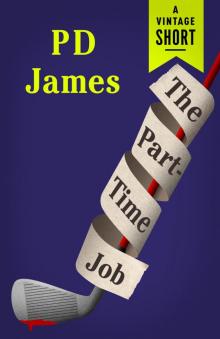 The Part-Time Job
The Part-Time Job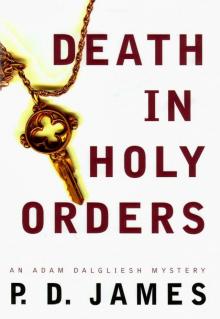 Death in Holy Orders
Death in Holy Orders The Victim
The Victim Shroud for a Nightingale
Shroud for a Nightingale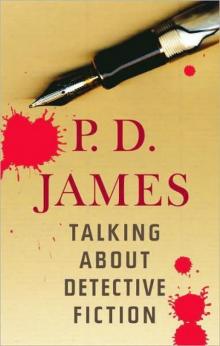 Talking about Detective Fiction
Talking about Detective Fiction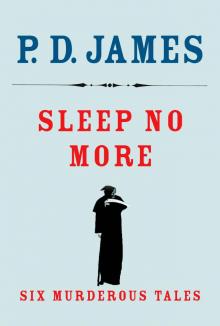 Sleep No More
Sleep No More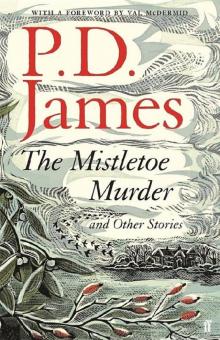 The Mistletoe Murder and Other Stories
The Mistletoe Murder and Other Stories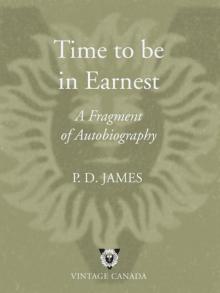 Time to Be in Earnest
Time to Be in Earnest Original Sin
Original Sin A Mind to Murder
A Mind to Murder Cover Her Face
Cover Her Face Innocent Blood
Innocent Blood Devices and Desires
Devices and Desires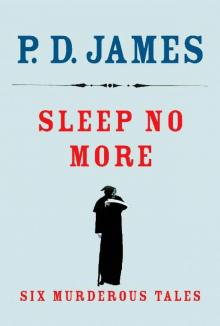 Sleep No More: Six Murderous Tales
Sleep No More: Six Murderous Tales Death Comes to Pemberley
Death Comes to Pemberley The Mistletoe Murder
The Mistletoe Murder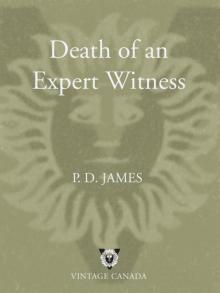 Death of an Expert Witness
Death of an Expert Witness The Private Patient
The Private Patient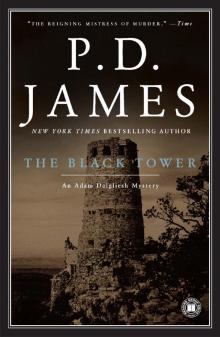 The Black Tower
The Black Tower Devices & Desires - Dalgleish 08
Devices & Desires - Dalgleish 08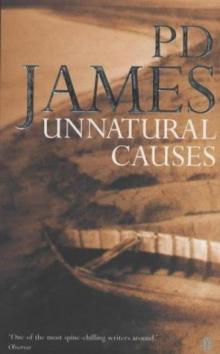 Unnatural Causes
Unnatural Causes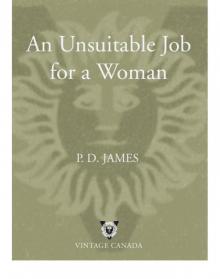 An Unsuitable Job for a Woman
An Unsuitable Job for a Woman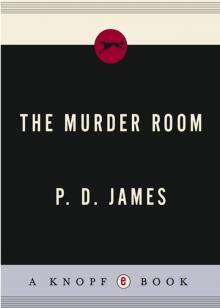 The Murder Room
The Murder Room A Certain Justice
A Certain Justice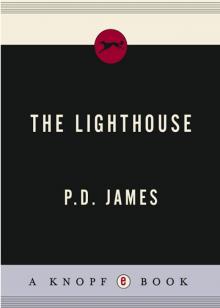 The Lighthouse
The Lighthouse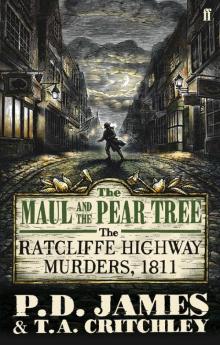 The Maul and the Pear Tree
The Maul and the Pear Tree